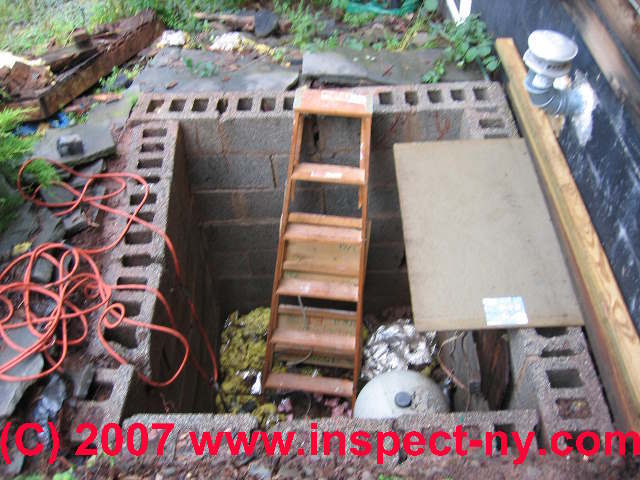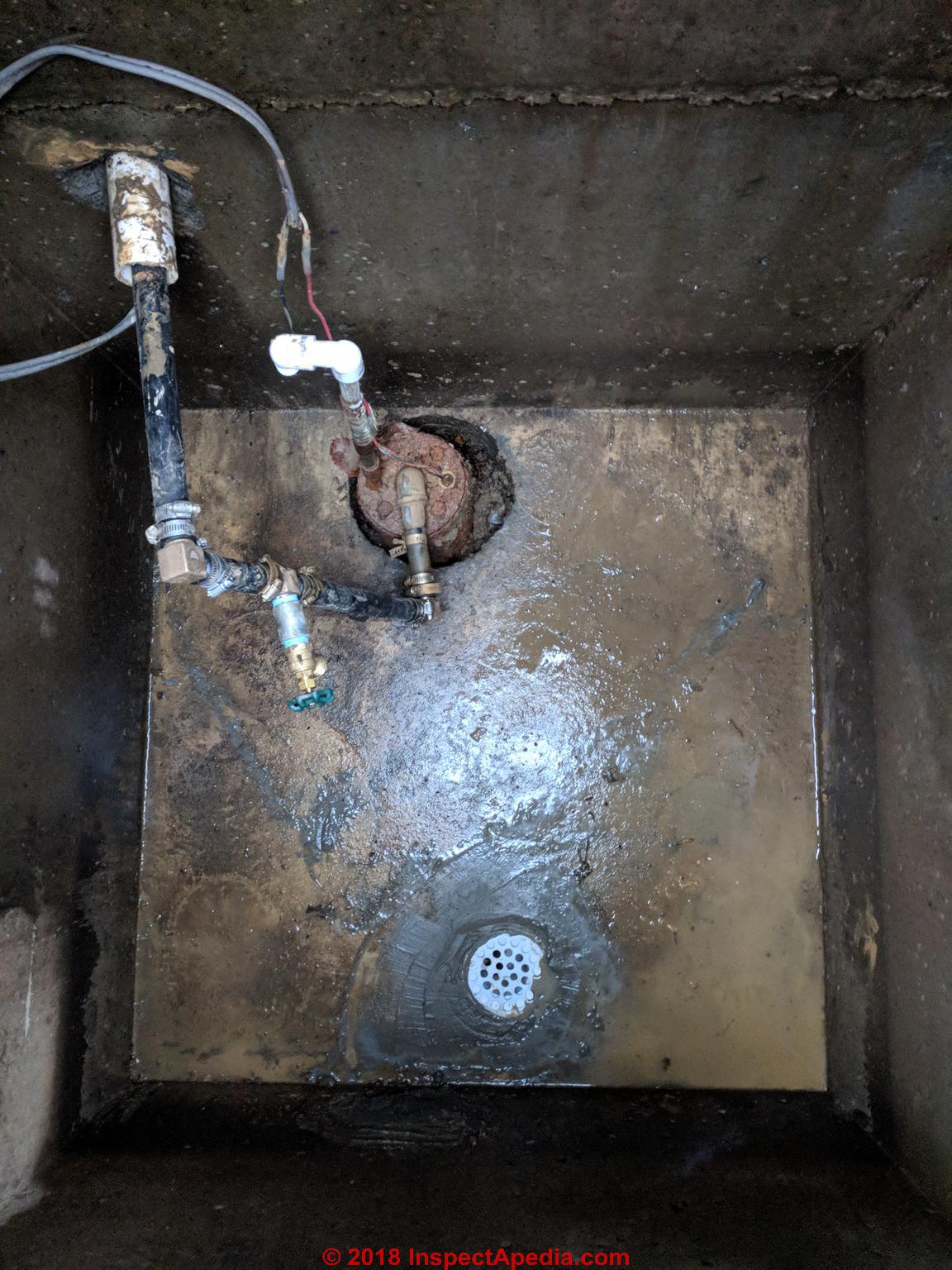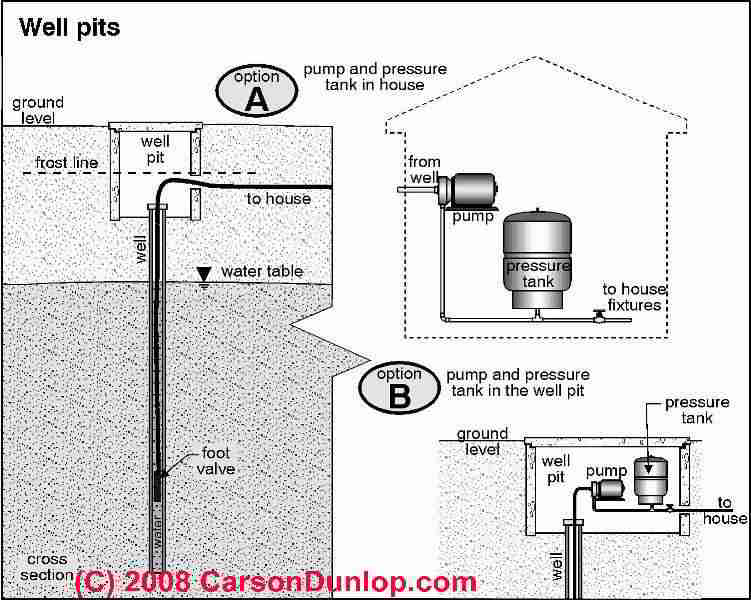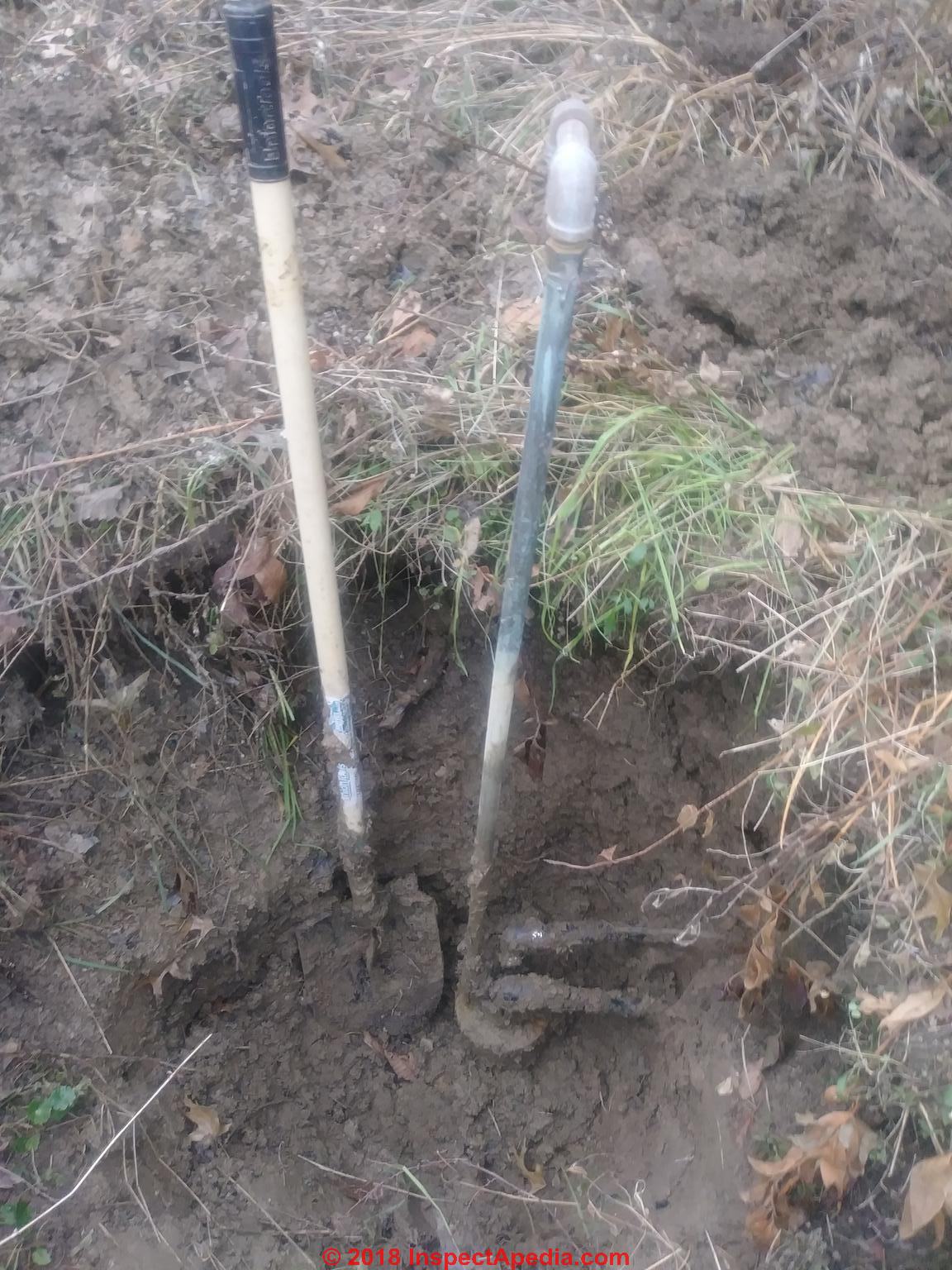 Well Pit Construction FAQs
Well Pit Construction FAQs
Q&A on well vaults, pits,
troubleshooting
- POST a QUESTION or COMMENT about using a well pit to protect well piping & equipment from freezing;
Well vault or well pit questions & answers.
This article series describes Well Pits to Contain Water Equipment & Well Access. We provide advice about what to do when things go wrong.
InspectAPedia tolerates no conflicts of interest. We have no relationship with advertisers, products, or services discussed at this website.
- Daniel Friedman, Publisher/Editor/Author - See WHO ARE WE?
FAQs on Well Pits for Well Heads, Pressure Tanks, Pumps, Controls
 These questions and answers about Well Pits or Well Vaults & Why they are used were posted originally
These questions and answers about Well Pits or Well Vaults & Why they are used were posted originally
at WELL PITS - so please be sure to check out the definitions, construction advice, and troubleshooting help given there.
[Click to enlarge any image]
On 2019-01-08 by (mod) - keeping unsanitary surface water out of the well vault & out of the well
I would clean the surfaces involved and use first a silicone or other sticky sealant; you may not get a perfect and durable outdoor seal with just concrete against steel.
Watch out: if surface runoff is also passing around our well vault well crypt well pit and beneath it, just sealing the casing inside the well pit at the pit floor won't prevent that other water from passing down the casing - IF - in fact the casing's original seal is defective.
It would make sense to have your well water tested for bacteria.
On 2019-01-08 by Rees
So it isn't sealed. A ring of concrete around the well casing at the floor level?
On 2019-01-08 by (mod) -
I like well crypt.
Indeed more than once I had to use a broomstick to reach down into a flooded well "crypt" to flip off electrical power there.
The floor drain, if working by gravity, is a superb treatment to keep the crypt from flooding. Watch that the outlet end doesn 't clog.
If you can improve surface drainage away from the crypt exterior as well as sloping water away from the casing that'd be worth doing.
A well casing, properly installed, was sealed around the casing exterior when the well was first installed, in an effort to prevent surface water from running down the original borehole on the outside of the casing and thus entering and contaminating the well itself.
On 2019-01-08 by Anonymous - well crypt = well vault = well pit
I think I'll use wellcrypt, in view of all the potential for infection and electrocution. (In fact, I was frustratedly running a metal snake down an old PVC pipe while it was flooded when I suddenly realized I hadn't cut the power to the wellpump. . . YIKES!!!)
The floor drain upon which you remark is what I had recently installed, connected to 3" PVC pipe. It runs 36 ft. gradually downhill into a shallow ravine in the woods. Has a plastic shower screen at the low end.
I believe keeping the wellcrypt watertight can't happen. Water seeps in from multiple cracks in the concrete walls. That's why I'm trying to be certain any water that enters it drains out immediately.
The wellcasing extends about 4" above the floor. So, I'm considering packing concrete in the hole from which it rises, so that any accumulating water goes down the drain, not outside the casing.
Thanks!
On 2019-01-08 by (mod) - protect the well vault from flooding
Rees
Thank you for your note. Certainly we are very appreciative of the fact that in different parts of even individual countries and certainly around the world people use different terms for similar or even the same construction features.
So one woman's well pit is another's well vault. And it's good to have both terms in the written material so that people can find what they're looking for.
I agree that you definitely don't want the well casing vents to be flooded as you're bound to be contaminating your well.
If that has already happened it's possible that you need to sanitize the well.
In the ARTICLE INDEX near the end of this article above you will find links to procedures for shocking the well or sanitizing the well.
Although you could simply extend that vent upwards, I'm nervous about the whole situation. That's because particularly on some older well casing tops the top is not really watertight.
That's why it was projecting above floor level in your well Vault.
So we really don't want the well vault to be flooding. If there's electrical wiring present could even be fatal.
So my preference would be to identify the sources of water entry into the well vault and to correct those.
If you absolutely can't do that you may need to put a sump pump in the well pit to keep it dry.
Also, i noticed that there was a drain in the pit or well vault bottom. That's not something that I've see. Often.
I think that's because there's some question of where the drain could possibly be going.
About what you think is a photo of your well vault, unless you provided one to us that won't be the case, and we would not use your image without express permission; but indeed lots of well vaults look very similar.
On 2019-01-07 by Rees
 My email is winwinsit@gmail.com
My email is winwinsit@gmail.com
Hi! I was surprised and pleased to find the picture of my wellpit (I'd say wellvault, but you're the pro) on your website.
An update.
On the little vent coming from the wellhead (pointing straight up in the air) I put a PVC pipe rerouting and facing downward, with a screen in the end; that way, dirt and dirty water from above can't go into the well itself.
I also built a little wooden roof over the entire wellpit, to keep water from dripping in around the top cover.
But I then realized the wellpit was flooding badly, 2-12 inches of water standing for weeks at a time.
I assume water seeped in through the horizontal crack between the top and bottom concrete walls.
Sketch courtesy of Carson Dunlop Associates, a Toronto home inspection, education, and report-writing firm.
The little PVC pipe entering from the picture now shown above on this page (which I'd thought was a drain) was blocked, so I had the side of the concrete box dug out and a three inch PVC pipe and drain installed in the floor.
While I was at it, I had the pressure tank (which seemed completely nonfunctional) removed, relying on the 20 gallon one in the house. See the image.
But the concrete floor around the well casing remains open below; earth can be seem below it through the hole. Should I seal the hole with concrete, to keep any water from running down beside the well casing?
Rees
On 2018-12-15 by (mod) - types of well caps
 I may need to large the picture for to tell so I'm not sure I'm seeing everything pertinent to your question.
I may need to large the picture for to tell so I'm not sure I'm seeing everything pertinent to your question.
However what I see looks like to well casing side-by-side both originally designed for a two line jet pump.
The cap is a type that would have been conventional for being buried below grade and of course if it's not in good condition would be at risk of leaking surface runoff into your well
On 2018-12-15 by John Nagy
My question is.
What type of well cap is this. From Hinckley Ohio. Approximately the mid 1950s
Thank You
Please email me at
jnagy197163@gmail.com
On 2018-02-03 by (mod) - our house piping is frozen & we have no heate
Jeanette
I am GUESSING that you are saying your pipes were frozen and you had no water and you're trying to thaw things out.
You need to trace the piping to find the most-likely frozen spots and add heat in those areas.
See details at PIPE FREEZE-UP POINTS https://inspectapedia.com/plumbing/Pipe_Freeze_Points.php where we mention where water supply pipes are most-likely to freeze
and HEAT SOURCES to AVOID FROZEN PIPES https://inspectapedia.com/plumbing/Pipe_Heat_Add_Points.php
and if necessary also see DRAIN FREEZE PROTECTION at https://inspectapedia.com/plumbing/Drain_Pipe_Freeze_Points.php where we give examples of where pipes freeze on drains
On 2018-02-03 by Jeanette
Space heaters been on 13 hours and no water
On 2016-10-21 by Dean - North Dakota temporary well pit cover
Thank you again. Unfortunately, the house is 30 miles from where we live. We are renting it out. I did put the boards on for this winter. If we get down there again before the snow flies I will take some pictures. The renters usually shovel snow over the top for added insulation.
It would be interesting to experiment with a jug of water, but I suppose a real test would have to be at 30+ below. I did a little math. If the pit is perfectly round (big question) and 37 inches in diameter, 14-8 inch sides and one 4 inch side works out almost perfectly. I must have counted wrong when I got 13 sides but will have to double check before proceeding. A pattern may not be so hard after all.
On 2016-10-21 by (mod) - ND Well pit cover
Yes, Dean. If it were my place and if I could watch it during freezing weather I'd experiment with leaving out the boards etc. just as you originally considered. But from a remote e-seat I'm reluctant to risk freezing damage to your system. I'd like to see photos of the situation - use the page bottom CONTACT link if you're inclined to share. (You're just a youngster compared to me).
On 2016-10-21 by Dean
Thank you for responding. I think you are suggesting that at the least we should continue placing the boards as a second cover or replacing the boards with the 2 inch foam that I mentioned. I may not have been clear that the boards are horizontal across the pit so are like having a second cover 28 inches below ground level.
The pit is basically round but it actually has 13-8 inch sides and one 4 inch side. It looks like they may have used 8 inch vertical boards to form 36 inch or so diameter pit. That's why the pattern is a bit challenging. I am amazed how well the boards originally fit. It's too bad I didn't make a pattern earlier. The well has been there a very long time. I suspect it was built by my great-grandfather or possibly my grandfather. I am 69.
I can get into the pit and my father was able to. The cover is similar to the ones you see on streets. It's possible they acquired a nice cover and just decided to use it.
On 2016-10-21 by (mod) - frost proof well pit in Fargo North Dakota
The frost depth around Fargo is 54" or deeper and becomes deeper further into early spring. The fact that your water line doesn't freeze at 6 ft. suggests that as a safe depth for your location. Air is less conductive than soil, so the theory of well pits is that the depth of the pit is sufficient to protect the well head and water equipment from freezing.
2" foil faced foam supported on furring strips nailed or tapcon-fastened to the well pit sides would be a nice improvement. The problem is that tiny 19" diameter manhole. One can but wonder what the heck someone was thinking. And on re-reading your note I guess you're saying the well pit is round - thus the need for a pattern.
If it's too difficult to insulate inside the well pit, two options are to construct an insulating cover over the exterior of the pit or to provide a small heat source - electric heater or even a bulb - in the pit.
On 2016-10-2 by Dean
Our well pit is 9 feet deep and 36 inches in diameter with sides of poured concrete. The bottom is sand. The top is concrete with a 19 inch metal manhole cover. The well pit used to contain the pump and pressure tank but a submersible pump has been installed and the pressure tank moved into the basement. The water line to the house is located 6 feet below ground level. We Iive in Minnesota about 60 miles south of Fargo, ND.
Every winter we have installed a layer of boards in the well pit about 28 inches below ground level as an insulation measure. This dates back to when the pressure tank and pump were in the pit. The boards are in pretty bad condition and I was considering replacing them with 2 inch foam but fitting the foam to the shape of the pit will be a challenge.
The boards aren't in good enough condition to provide a pattern. I am wondering if the boards are necessary considering the pressure tank and pump have been removed and the depth of the pit. Thank you.
On 2016-03-08 by (mod) - Where can buy a new well pit cover?
Sharwa
If your well pit is like most it was site built, as would be the cover - it's a handyman job if you want a wood framed roof, or it's a local mason can build one for you. of concrete with an access opening.
But be sure the cover is child-safe in all regards.
On 2016-03-07 by sharwa
Where can buy a new well pit cover? What type of business would know? My plumbers do not.
On 2016-02-07 by (mod) -
Because there may be fatal electrical shock hazards present I would leave power off until you can get help from an electrician
On 2016-02-04 by Dustin
My well house which is ground level , flooded with a ft of water and now my tank has no air pressure or even come on at all what do I do
...
Continue reading at WELL PITS - topic home, or select a topic from the closely-related articles below, or see the complete ARTICLE INDEX.
Or see these
Recommended Articles
- PIPE FREEZE-UP POINTS - where water suppy systems tend to freeze-up
- PITLESS ADAPTERS
- WELL CAPS & COVERS safety and sealing requirements
- WELL CASING LEAK REPAIRS
Suggested citation for this web page
WELL PIT FAQs at InspectApedia.com - online encyclopedia of building & environmental inspection, testing, diagnosis, repair, & problem prevention advice.
Or see this
INDEX to RELATED ARTICLES: ARTICLE INDEX to WATER SUPPLY, PUMPS TANKS WELLS
Or use the SEARCH BOX found below to Ask a Question or Search InspectApedia
Ask a Question or Search InspectApedia
Questions & answers or comments about well pits as a method to protect well piping from freezing.
Try the search box just below, or if you prefer, post a question or comment in the Comments box below and we will respond promptly.
Search the InspectApedia website
Note: appearance of your Comment below may be delayed: if your comment contains an image, photograph, web link, or text that looks to the software as if it might be a web link, your posting will appear after it has been approved by a moderator. Apologies for the delay.
Only one image can be added per comment but you can post as many comments, and therefore images, as you like.
You will not receive a notification when a response to your question has been posted.
Please bookmark this page to make it easy for you to check back for our response.
IF above you see "Comment Form is loading comments..." then COMMENT BOX - countable.ca / bawkbox.com IS NOT WORKING.
In any case you are welcome to send an email directly to us at InspectApedia.com at editor@inspectApedia.com
We'll reply to you directly. Please help us help you by noting, in your email, the URL of the InspectApedia page where you wanted to comment.
Citations & References
In addition to any citations in the article above, a full list is available on request.
- In addition to citations & references found in this article, see the research citations given at the end of the related articles found at our suggested
CONTINUE READING or RECOMMENDED ARTICLES.
- Carson, Dunlop & Associates Ltd., 120 Carlton Street Suite 407, Toronto ON M5A 4K2. Tel: (416) 964-9415 1-800-268-7070 Email: info@carsondunlop.com. Alan Carson is a past president of ASHI, the American Society of Home Inspectors.
Thanks to Alan Carson and Bob Dunlop, for permission for InspectAPedia to use text excerpts from The HOME REFERENCE BOOK - the Encyclopedia of Homes and to use illustrations from The ILLUSTRATED HOME .
Carson Dunlop Associates provides extensive home inspection education and report writing material. In gratitude we provide links to tsome Carson Dunlop Associates products and services.

